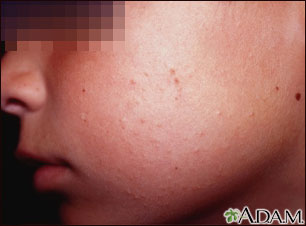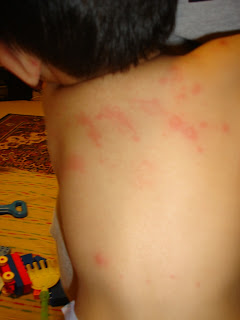My Take on Vaccinations
Just returned from Son #2's 6 month check-up, where he received a couple of jabs to his chubby little thighs. (brave boy- hardly even cried!)
I am often asked about the safety of vaccines by concerned parents who are frightened that they are putting their children at risk of adverse reactions by following the recommended immunization schedule. I fully understand the sentiment behind not wanting to take a risk (even if it is only a perceived risk) when the diseases we vaccinate against seem like ancient history.
Let me put it plainly- the fact that these illnesses: polio, mumps, measles, diphtheria... seem like history is testament to the enormous public health success of immunizing children. Immunizations are the reason that we don't lose our precious children to horrible diseases like epiglottitis, meningitis, and measles at the alarming rates seen in previous generations.
Let me use measles as an example, as the U.S. Court of Federal Claims recently delivered decisions on the Omnibus Autism Proceeding:
Measles is still a very real threat in many parts of the world. In poor countries, this virus is responsible for the death of approximately 250,000 children per year.
People in developed countries like ours easily become complacent, and think that their children will be protected by herd immunity (which is a nice way of saying that you'll let other people vaccinate their kids so you don't have to vaccinate yours). But guess what? Herd immunity is only as good as the number of people who actually get immunized. And as more and more parents "conscientiously object" to vaccinating their children, herd immunity disintegrates.
The decision to leave children unvaccinated is to blame for recent epidemics of measles seen in both the U.S. and Europe. It starts like this- someone travels overseas, and contracts the highly contagious measles virus. Then they bring it back on the plane, exposing who knows how many people during the trip. Once back home, they infect even more people. Guess who gets sick as stink? The vast majority of those who contracted measles in the U.S. in 2008 (during the biggest measles outbreak in 10 years) were unvaccinated.
No one wants their children (or anyone else's, for that matter) to become seriously ill. No one wishes developmental challenges or regression upon any child. But it's unfair to pin the blame for conditions such as autism on vaccination without proper evidence- the scientific literature simply does not support an association between immunization and autism. This is not a conspiracy cooked up by pediatricians and drug companies. If it was, you wouldn't see us vaccinating our own children.
That said, there are occasionally good reasons not to pursue certain vaccinations.
Some children who are immunodeficient cannot tolerate live-virus vaccines such as MMR, oral polio or varicella, because they might actually contract the illness from the weakened virus in the immunization. These are the children whose lives truly depend on herd immunity.
Other children are truly allergic to components of vaccines, such as egg protein or gelatin, and need to be immunized in a stepwise fashion, under the supervision of an allergist.
If you're concerned about vaccinating your child, please have an open conversation with your child's doctor. Too many parents are afraid to broach the subject for fear of being chastised, and then they end up getting bad information which scares them even more. Pediatricians are trained to have this discussion with parents, and they will work with you to give you all the information you need to feel comfortable with immunizations, how they work, and what to expect from vaccines. You're not going to booted out the door for having questions. At the end of the day, we all have the same agenda- keeping children as healthy as possible.
If you need a reliable source for information about vaccines, visit the Centers for Disease Control and Pevention, at http://cdc.gov/vaccines
I am often asked about the safety of vaccines by concerned parents who are frightened that they are putting their children at risk of adverse reactions by following the recommended immunization schedule. I fully understand the sentiment behind not wanting to take a risk (even if it is only a perceived risk) when the diseases we vaccinate against seem like ancient history.
Let me put it plainly- the fact that these illnesses: polio, mumps, measles, diphtheria... seem like history is testament to the enormous public health success of immunizing children. Immunizations are the reason that we don't lose our precious children to horrible diseases like epiglottitis, meningitis, and measles at the alarming rates seen in previous generations.
Let me use measles as an example, as the U.S. Court of Federal Claims recently delivered decisions on the Omnibus Autism Proceeding:
Measles is still a very real threat in many parts of the world. In poor countries, this virus is responsible for the death of approximately 250,000 children per year.
People in developed countries like ours easily become complacent, and think that their children will be protected by herd immunity (which is a nice way of saying that you'll let other people vaccinate their kids so you don't have to vaccinate yours). But guess what? Herd immunity is only as good as the number of people who actually get immunized. And as more and more parents "conscientiously object" to vaccinating their children, herd immunity disintegrates.
The decision to leave children unvaccinated is to blame for recent epidemics of measles seen in both the U.S. and Europe. It starts like this- someone travels overseas, and contracts the highly contagious measles virus. Then they bring it back on the plane, exposing who knows how many people during the trip. Once back home, they infect even more people. Guess who gets sick as stink? The vast majority of those who contracted measles in the U.S. in 2008 (during the biggest measles outbreak in 10 years) were unvaccinated.
No one wants their children (or anyone else's, for that matter) to become seriously ill. No one wishes developmental challenges or regression upon any child. But it's unfair to pin the blame for conditions such as autism on vaccination without proper evidence- the scientific literature simply does not support an association between immunization and autism. This is not a conspiracy cooked up by pediatricians and drug companies. If it was, you wouldn't see us vaccinating our own children.
That said, there are occasionally good reasons not to pursue certain vaccinations.
Some children who are immunodeficient cannot tolerate live-virus vaccines such as MMR, oral polio or varicella, because they might actually contract the illness from the weakened virus in the immunization. These are the children whose lives truly depend on herd immunity.
Other children are truly allergic to components of vaccines, such as egg protein or gelatin, and need to be immunized in a stepwise fashion, under the supervision of an allergist.
If you're concerned about vaccinating your child, please have an open conversation with your child's doctor. Too many parents are afraid to broach the subject for fear of being chastised, and then they end up getting bad information which scares them even more. Pediatricians are trained to have this discussion with parents, and they will work with you to give you all the information you need to feel comfortable with immunizations, how they work, and what to expect from vaccines. You're not going to booted out the door for having questions. At the end of the day, we all have the same agenda- keeping children as healthy as possible.
If you need a reliable source for information about vaccines, visit the Centers for Disease Control and Pevention, at http://cdc.gov/vaccines



Comments
Post a Comment
Thanks for taking the time to comment on this blog's posts! Let's keep the discussion engaging and free of frivolous advertising or vulgarity. It's a family show, folks!